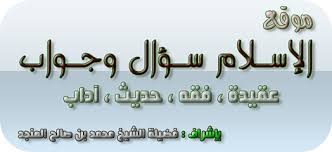

Ruling on drinking whilst standing
21147
Question
I have read some Ahaadeeth which say that it is forbidden to drink whilst standing. Does this mean that drinking whilst standing is prohibited?
Answer
Praise be to Allaah.
There are Ahaadeeth which say that the Prophet (peace and blessings of Allaah be upon him) forbade drinking whilst standing. For example, Muslim (2024, 2025) narrated from Anas and Abu Sa’eed al-Khudri (may Allaah be pleased with him) that the Prophet (peace and blessings of Allaah be upon him) forbade drinking whilst standing.
But there are other Ahaadeeth which say that the Prophet (peace and blessings of Allaah be upon him) drank whilst standing, such as the following:
Al-Bukhaari (1637) and Muslim (2027) narrated that Ibn Mas’ood (may Allaah be pleased with him) said: I brought water to the Messenger of Allaah (peace and blessings of Allaah be upon him) from Zamzam and he drank whilst standing.
Al-Bukhaari (5615) narrated from ‘Ali (may Allaah be pleased with him) that he drank whilst standing then he said: Some people say it is makrooh for one of you to drink whilst standing, but I saw the Prophet (peace and blessings of Allaah be upon him) doing what you have seen me do.
Ahmad (797) narrated that ‘Ali ibn Abi Taalib (may Allaah be pleased with him) drank whilst standing, and the people looked at him as if they objected to that. He said: “What are you looking at? If I drink whilst standing, I saw the Prophet (peace and blessings of Allaah be upon him) drink whilst standing, and if I drink sitting, I saw the Prophet (peace and blessings of Allaah be upon him) drink whilst sitting.”
Ahmad Shaakir said in Tahqeeq al-Musnad: its isnaad is saheeh.
Al-Tirmidhi (1881) narrated that Ibn ‘Umar (may Allaah be pleased with him) said: “We used to eat at the time of the Messenger of Allaah (peace and blessings of Allaah be upon him) whilst walking, and we used to drink whilst standing.”
Classed as saheeh by al-Albaani in Saheeh al-Tirmidhi.
The scholars reconciled these hadeeth by stating that the forbidding mentioned here does not mean that it is haraam, rather it is to be understood as advice, and that it is better to drink whilst sitting. The ahaadeeth which describe the Prophet (peace and blessings of Allaah be upon him) drinking whilst standing indicate that it is permissible to do that.
Al-Nawawi (may Allaah have mercy on him) said:
There is no contradiction in these ahaadeeth, praise be to Allaah, and none of them are da’eef (weak). Rather they are all saheeh. The correct view is that the forbidding mentioned in them is to be understood as meaning that it is disliked. The fact that the Prophet (peace and blessings of Allaah be upon him) drank whilst standing indicates that it is permissible to do so. This is all that needs to be said on the matter.
If it is asked: How come it is makrooh to drink whilst standing when the Prophet (peace and blessings of Allaah be upon him) did that?
The answer is that if what he (peace and blessings of Allaah be upon him) did was to show that it is permissible, then it is not makrooh, rather he (peace and blessings of Allaah be upon him) was obliged to show and explain that, so how can it be makrooh? It is proven that the Prophet (peace and blessings of Allaah be upon him) did wudoo’ washing each part only once, and that he circumambulated the Ka’bah (i.e., did tawaaf) riding a camel – even though there is scholarly consensus that it is better to do wudoo’ washing each part three times and that it is better to do tawaaf walking. There are many similar examples. The Prophet (peace and blessings of Allaah be upon him) was demonstrating that something is permissible one time or many times, but he persisted in following the better option. So usually when he did wudoo’ he washed each part three times, and he usually did tawaaf walking, and he usually drank whilst sitting. This is clear and is not confusing to anyone who has the slightest claim to knowledge. And Allaah knows best.
This reconciliation between the ahaadeeth was suggested by Al-Khattaabi, Ibn Battaal, Al-Tabari and others.
Al-Haafiz said in Fath al-Baari:
This is the best and soundest explanation, and the farthest removed from contradiction.
It says in Fataawa al-Lajnah al-Daa’imah (22/133):
The basic ruling is that one should drink whilst sitting, which is better, but one may drink whilst standing. The Prophet (peace and blessings of Allaah be upon him) did both to demonstrate that there is a lot of room for manoeuvre in this matter.

21147
السؤال
قرأت أحاديث في النهي عن الشرب قائماً ، فهل معنى ذلك أن الشرب قائماً حرام ؟
الجواب
الحمد لله
وردت أحاديث عن النبي صَلَّى اللَّهُ عَلَيْهِ وَسَلَّمَ بالنهي عن الشرب قائماً ، منها ما رواه مسلم (2024) (2025) عَنْ أَنَسٍ وأَبِي سَعِيدٍ الْخُدْرِيِّ رضي الله عنهما أَنَّ النَّبِيَّ صَلَّى اللَّهُ عَلَيْهِ وَسَلَّمَ زَجَرَ ( في لفظ : نَهَى) عَنْ الشُّرْبِ قَائِمًا
ووردت أحاديث أخرى أن النبي صَلَّى اللَّهُ عَلَيْهِ وَسَلَّمَ شرب قائماً ، منها
ما رواه البخاري (1637) مسلم (2027) عَنْ ابْنِ عَبَّاسٍ رَضِيَ اللَّهُ عَنْهُما قَالَ : سَقَيْتُ رَسُولَ اللَّهِ صَلَّى اللَّهُ عَلَيْهِ وَسَلَّمَ مِنْ زَمْزَمَ فَشَرِبَ وَهُوَ قَائِمٌ
وروى البخاري (5615) عن عَلِيّ رَضِيَ اللَّهُ عَنْهُ أنه شَرِبَ قَائِمًا ثم قَالَ : إِنَّ نَاسًا يَكْرَهُ أَحَدُهُمْ أَنْ يَشْرَبَ وَهُوَ قَائِمٌ ، وَإِنِّي رَأَيْتُ النَّبِيَّ صَلَّى اللَّهُ عَلَيْهِ وَسَلَّمَ فَعَلَ كَمَا رَأَيْتُمُونِي فَعَلْتُ
وروى أحمد (797) أَنَّ عَلِيَّ بْنَ أَبِي طَالِبٍ رَضِيَ اللَّهُ عَنْهُ شَرِبَ قَائِمًا ، فَنَظَرَ إِلَيْهِ النَّاسُ كَأَنَّهُمْ أَنْكَرُوهُ فَقَالَ : مَا تَنْظُرُونَ ! إِنْ أَشْرَبْ قَائِمًا فَقَدْ رَأَيْتُ النَّبِيَّ صَلَّى اللَّهُ عَلَيْهِ وَسَلَّمَ يَشْرَبُ قَائِمًا ، وَإِنْ أَشْرَبْ قَاعِدًا فَقَدْ رَأَيْتُ النَّبِيَّ صَلَّى اللَّهُ عَلَيْهِ وَسَلَّمَ يَشْرَبُ قَاعِدًا
. قال أحمد شاكر في تحقيق المسند : إسناده صحيح اهـ
وروى الترمذي (1881) عَنْ ابْنِ عُمَرَ رَضِيَ اللَّهُ عَنْهُما قَالَ : كُنَّا نَأْكُلُ عَلَى عَهْدِ رَسُولِ اللَّهِ صَلَّى اللَّهُ عَلَيْهِ وَسَلَّمَ وَنَحْنُ نَمْشِي ، وَنَشْرَبُ وَنَحْنُ قِيَامٌ . صححه الألباني في صحيح الترمذي
وقد جمع العلماء بين هذه الأحاديث بأن النهي ليس للتحريم وإنما هو محمول على الإرشاد ، وأن الأفضل أن يشرب جالساً ، وأحاديث شرب النبي صَلَّى اللَّهُ عَلَيْهِ وَسَلَّمَ قائماً تدل على جواز ذلك
قال النووي رحمه الله
"لَيْسَ فِي هَذِهِ الأَحَادِيث بِحَمْدِ اللَّه تَعَالَى إِشْكَال , وَلا فِيهَا ضَعْف , بَلْ كُلّهَا صَحِيحَة , وَالصَّوَاب فِيهَا أَنَّ النَّهْي فِيهَا مَحْمُول عَلَى كَرَاهَة التَّنْزِيه . وَأَمَّا شُرْبه صَلَّى اللَّه عَلَيْهِ وَسَلَّمَ قَائِمًا فَبَيَان لِلْجَوَازِ فَلا إِشْكَال وَلا تَعَارُض , وَهَذَا الَّذِي ذَكَرْنَاهُ يَتَعَيَّن الْمَصِير إِلَيْهِ
فَإِنْ قِيلَ : كَيْف يَكُون الشُّرْب قَائِمًا مَكْرُوهًا وَقَدْ فَعَلَهُ النَّبِيّ صَلَّى اللَّه عَلَيْهِ وَسَلَّمَ ؟
فَالْجَوَاب : أَنَّ فِعْله صَلَّى اللَّه عَلَيْهِ وَسَلَّمَ إِذَا كَانَ بَيَانًا لِلْجَوَازِ لا يَكُون مَكْرُوهًا , بَلْ الْبَيَان وَاجِب عَلَيْهِ صَلَّى اللَّه عَلَيْهِ وَسَلَّمَ , فَكَيْف يَكُون مَكْرُوهًا وَقَدْ ثَبَتَ عَنْهُ أَنَّهُ صَلَّى اللَّه عَلَيْهِ وَسَلَّمَ تَوَضَّأَ مَرَّة مَرَّة وَطَافَ عَلَى بَعِير مَعَ أَنَّ الإِجْمَاع عَلَى أَنَّ الْوُضُوء ثَلاثًا وَالطَّوَاف مَاشِيًا أَكْمَل , وَنَظَائِر هَذَا غَيْر مُنْحَصِرَة , فَكَانَ صَلَّى اللَّه عَلَيْهِ وَسَلَّمَ يُنَبِّه عَلَى جَوَاز الشَّيْء مَرَّة أَوْ مَرَّات , وَيُوَاظِب عَلَى الأَفْضَل مِنْهُ, وَهَكَذَا كَانَ أَكْثَر وُضُوئِهِ صَلَّى اللَّه عَلَيْهِ وَسَلَّمَ ثَلاث ثَلاثًا , وَأَكْثَر طَوَافه مَاشِيًا , وَأَكْثَر شُرْبه جَالِسًا ، وَهَذَا وَاضِح لا يَتَشَكَّك فِيهِ مَنْ لَهُ أَدْنَى نِسْبَة إِلَى عِلْم . وَاللَّهُ أَعْلَم" اهـ
وهذا الجمع بين الأحاديث قد قال به الْخَطَّابِيّ وَابْن بَطَّال والطَّبَرِيُّ . . . وغيرهم
قال الحافظ في "فتح الباري"
وَهَذَا أَحْسَن الْمَسَالِك وَأَسْلَمهَا وَأَبْعَدهَا مِنْ الاعْتِرَاض اهـ
وقد جاء في فتاوى اللجنة الدائمة (22/133)
"الأصل أن يشرب الإنسان قاعداً ، وهو الأفضل ، وله أن يشرب قائماً ، وقد فعل النبي صَلَّى اللَّهُ عَلَيْهِ وَسَلَّمَ الأمرين للدلالة على أن الأمر في ذلك واسع" اهـ



SELECTED AHADEETH FOR THE MONTH OF DHUL HIJJAH
نَهْيِ مَنْ دَخَلَ عَلَيْهِ عَشْرُ ذِي الْحِجَّةِ وَهُوَ مُرِيدُ التَّضْحِيَةِ أَنْ يَأْخُذَ مِنْ شَعْرِهِ أَوْ أَظْفَارِهِ شَيْئًا
Chapter: When the first ten days of Dhul-Hijjah begin, it is forbidden for the one who wants to offer a sacrifice to remove anything from his hair, nails or skin
وَحَدَّثَنِي عُبَيْدُ اللَّهِ بْنُ مُعَاذٍ الْعَنْبَرِيُّ، حَدَّثَنَا أَبِي، حَدَّثَنَا مُحَمَّدُ بْنُ عَمْرٍو اللَّيْثِيُّ، عَنْ عُمَرَ بْنِ مُسْلِمِ بْنِ عَمَّارِ بْنِ أُكَيْمَةَ اللَّيْثِيِّ، قَالَ سَمِعْتُ سَعِيدَ بْنَ الْمُسَيَّبِ، يَقُولُ سَمِعْتُ أُمَّ سَلَمَةَ، زَوْجَ النَّبِيِّ صلى الله عليه وسلم تَقُولُ قَالَ رَسُولُ اللَّهِ صلى الله عليه وسلم " مَنْ كَانَ لَهُ ذِبْحٌ يَذْبَحُهُ فَإِذَا أُهِلَّ هِلاَلُ ذِي الْحِجَّةِ فَلاَ يَأْخُذَنَّ مِنْ شَعْرِهِ وَلاَ مِنْ أَظْفَارِهِ شَيْئًا حَتَّى يُضَحِّيَ " .
Saheeh Muslim
Umm Salama, the wife of Allah's Apostle (ﷺ), reported Allah's Messenger (ﷺ) to have said:
He who has a sacrificial animal with him whom (he intends) to offer as sacrifice, and he enters the month of Dhu'I-Hijja, he should not get his hair cut or nails trimmed until he has sacrificed the animal.

Chapter: The fast of the Prophet
أَخْبَرَنِي زَكَرِيَّا بْنُ يَحْيَى، قَالَ حَدَّثَنَا شَيْبَانُ، قَالَ حَدَّثَنَا أَبُو عَوَانَةَ، عَنِ الْحُرِّ بْنِ صَيَّاحٍ، عَنْ هُنَيْدَةَ بْنِ خَالِدٍ، عَنِ امْرَأَتِهِ، قَالَتْ حَدَّثَتْنِي بَعْضُ، نِسَاءِ النَّبِيِّ صلى الله عليه وسلم أَنَّ النَّبِيَّ صلى الله عليه وسلم كَانَ يَصُومُ يَوْمَ عَاشُورَاءَ وَتِسْعًا مِنْ ذِي الْحِجَّةِ وَثَلاَثَةَ أَيَّامٍ مِنَ الشَّهْرِ أَوَّلَ اثْنَيْنِ مِنَ الشَّهْرِ وَخَمِيسَيْنِ .
Sunan An-Nasa'i ,Graded saheeh Darus salaam
It was narrated from Hunaidah bin Khalid that his wife said:
"One of the wives of the Prophet said: "The Prophet used to fast on the day of 'Ashura, nine days of Dhul-Hijjah and three days each month: The first Monday of the month, and two Thursday."

باب فضل صوم يوم عرفة وعاشوراء وتاسوعاء
Chapter: The Excellence of Observing Saum on the Day of 'Arafah, 'Ashura' and Tasu'a (i.e., 9th of Muharram)
وعن أبي قتادة رضي الله عنه قال: سئل رسول الله صلى الله عليه وسلم: عن صوم يوم عرفة؟ قال: "يكفر السنة الماضية والباقية" ((رواه مسلم)).
Riyad as-Saliheen
Abu Qatadah (May Allah be pleased with him) reported:
The Messenger of Allah (ﷺ) was asked about the observance of Saum (fasting) on the day of 'Arafah. He said, "It is an expiation for the sins of the preceding year and the current year."
[Muslim].

باب فِي فَضْلِ الْحَجِّ وَالْعُمْرَةِ وَيَوْمِ عَرَفَةَ
Chapter: The virtue of the day of 'Arafah
حَدَّثَنَا هَارُونُ بْنُ سَعِيدٍ الأَيْلِيُّ، وَأَحْمَدُ بْنُ عِيسَى، قَالاَ حَدَّثَنَا ابْنُ وَهْبٍ، أَخْبَرَنِي مَخْرَمَةُ بْنُ بُكَيْرٍ، عَنْ أَبِيهِ، قَالَ سَمِعْتُ يُونُسَ بْنَ يُوسُفَ، يَقُولُ عَنِ ابْنِ الْمُسَيَّبِ، قَالَ قَالَتْ عَائِشَةُ إِنَّ رَسُولَ اللَّهِ صلى الله عليه وسلم قَالَ " مَا مِنْ يَوْمٍ أَكْثَرَ مِنْ أَنْ يُعْتِقَ اللَّهُ فِيهِ عَبْدًا مِنَ النَّارِ مِنْ يَوْمِ عَرَفَةَ وَإِنَّهُ لَيَدْنُو ثُمَّ يُبَاهِي بِهِمُ الْمَلاَئِكَةَ فَيَقُولُ مَا أَرَادَ هَؤُلاَءِ "
Saheeh Muslim
'A'isha (Allah be pleased with her) reported Allah's Messenger (ﷺ) as saying:
There is no day when Allah sets free more servants from Hell than the Day of 'Arafah. He draws near, then praises them to the angels, saying: What do these want?

الدعاء يوم عرفة
Chapter:The best Supplication on the Day of 'Arafah
خير الدعاء دعاء يوم عرفة ، وخيرُ ما قلت أنا والنبيُّون من قبلي
لا إله إلا الله وحدهُ لا شريك لهُ ، لهُ الملكُ ولهُ الحمدُ وهو على كل شيء قدي
Hisn Al-Muslim
The Prophet (ﷺ) said: The best invocation is that of the Day of Arafat, and the best that anyone can say is what I and the Prophets before me have said:
Lā 'ilāha 'illallāhu
waḥdahu lā sharīka lahu,
lahul-mulku wa lahul-ḥamdu
wa huwa `alā kulli shay'in qadīr.
None has the right to be worshipped but Allah Alone, Who has no partner. His is the dominion and His is the praise, and He is Able to do all things.
At-Tirmidhi. Al-Albani graded it good

باب فَضْلِ الْعَمَلِ فِي أَيَّامِ التَّشْرِيقِ
Chapter: Superiority of deeds on the days of Tashreeq
حَدَّثَنَا مُحَمَّدُ بْنُ عَرْعَرَةَ، قَالَ حَدَّثَنَا شُعْبَةُ، عَنْ سُلَيْمَانَ، عَنْ مُسْلِمٍ الْبَطِينِ، عَنْ سَعِيدِ بْنِ جُبَيْرٍ، عَنِ ابْنِ عَبَّاسٍ، عَنِ النَّبِيِّ صلى الله عليه وسلم أَنَّهُ قَالَ " مَا الْعَمَلُ فِي أَيَّامِ الْعَشْرِ أَفْضَلَ مِنَ الْعَمَلِ فِي هَذِهِ ". قَالُوا وَلاَ الْجِهَادُ قَالَ " وَلاَ الْجِهَادُ، إِلاَّ رَجُلٌ خَرَجَ يُخَاطِرُ بِنَفْسِهِ وَمَالِهِ فَلَمْ يَرْجِعْ بِشَىْءٍ ".
Saheeh al-Bukhari
Ibn `Abbas narrated :
The Prophet (ﷺ) said, "No good deeds done on other days are superior to those done on these (first ten days of Dhul Hijjah)." Then some companions of the Prophet (ﷺ) said, "Not even Jihad?" He replied, "Not even Jihad, except that of a man who does it by putting himself and his property in danger (for Allah's sake) and does not return with any of those things."

باب ذِكْرِ إِبَاحَةِ خُرُوجِ النِّسَاءِ فِي الْعِيدَيْنِ إِلَى الْمُصَلَّى وَشُهُودِ الْخُطْبَةِ مُفَارِقَاتٌ لِلرِّجَالِ
Chapter: It Is Permissible For Women To Go Out To The 'Id Prayer And Attend The Khutbah, Separated From The Men
وَحَدَّثَنَا عَمْرٌو النَّاقِدُ، حَدَّثَنَا عِيسَى بْنُ يُونُسَ، حَدَّثَنَا هِشَامٌ، عَنْ حَفْصَةَ بِنْتِ، سِيرِينَ عَنْ أُمِّ عَطِيَّةَ، قَالَتْ أَمَرَنَا رَسُولُ اللَّهِ صلى الله عليه وسلم أَنْ نُخْرِجَهُنَّ فِي الْفِطْرِ وَالأَضْحَى الْعَوَاتِقَ وَالْحُيَّضَ وَذَوَاتِ الْخُدُورِ فَأَمَّا الْحُيَّضُ فَيَعْتَزِلْنَ الصَّلاَةَ وَيَشْهَدْنَ الْخَيْرَ وَدَعْوَةَ الْمُسْلِمِينَ . قُلْتُ يَا رَسُولَ اللَّهِ إِحْدَانَا لاَ يَكُونُ لَهَا جِلْبَابٌ قَالَ " لِتُلْبِسْهَا أُخْتُهَا مِنْ جِلْبَابِهَا " .
Saheeh Muslim
Umm 'Atiyya reported:
The Messenger of Allah (ﷺ) commanded us to bring out on EId-ul-Fitr and EId-ul-Adha young women, menstruating women and hijab observing adult women. menstruating women kept back from prayer, but participated in goodness and supplication of the Muslims. I said: Messenger of Allah, one of us does not have an outer garment (to cover her face and body). He said: Let her sister cover her with her outer garment.

باب فِي الصَّدَقَةِ بِلُحُومِ الْهَدْىِ وَجُلُودِهَا وَجِلاَلِهَا
Chapter: Giving the meat, skin and blankets of the Hadi in charity; the butcher should not be given any of it; It is permissible to delegate someone else to offer the sacrifice
حَدَّثَنَا يَحْيَى بْنُ يَحْيَى، أَخْبَرَنَا أَبُو خَيْثَمَةَ، عَنْ عَبْدِ الْكَرِيمِ، عَنْ مُجَاهِدٍ، عَنْ عَبْدِ، الرَّحْمَنِ بْنِ أَبِي لَيْلَى عَنْ عَلِيٍّ، قَالَ أَمَرَنِي رَسُولُ اللَّهِ صلى الله عليه وسلم أَنْ أَقُومَ عَلَى بُدْنِهِ وَأَنْ أَتَصَدَّقَ بِلَحْمِهَا وَجُلُودِهَا وَأَجِلَّتِهَا وَأَنْ لاَ أُعْطِيَ الْجَزَّارَ مِنْهَا قَالَ " نَحْنُ نُعْطِيهِ مِنْ عِنْدِنَا " .
Saheeh Muslim
'Ali (Allah be pleased with him) reported:
Allah's Messenger (ﷺ) put me in charge of his sacrificial animals, that I should give their flesh. skins and saddle cloths as sadaqa, but not to give anything to the butcher, saying: We would pay him ourselves.

باب سُنَّةِ الأُضْحِيَّةِ
Chapter: The legal way of Al-Udhiya
حَدَّثَنَا مُسَدَّدٌ، حَدَّثَنَا إِسْمَاعِيلُ، عَنْ أَيُّوبَ، عَنْ مُحَمَّدٍ، عَنْ أَنَسِ بْنِ مَالِكٍ ـ رضى الله عنه ـ قَالَ قَالَ النَّبِيُّ صلى الله عليه وسلم " مَنْ ذَبَحَ قَبْلَ الصَّلاَةِ فَإِنَّمَا ذَبَحَ لِنَفْسِهِ، وَمَنْ ذَبَحَ بَعْدَ الصَّلاَةِ فَقَدْ تَمَّ نُسُكُهُ، وَأَصَابَ سُنَّةَ الْمُسْلِمِينَ ".
Saheeh Al-Bukhari
Anas bin Malik narrated:
The Prophet (ﷺ) said, "Whoever slaughtered the sacrifice before the prayer, he just slaughtered it for himself, and whoever slaughtered it after the prayer, he slaughtered it at the right time and followed the tradition of the Muslims."

باب فِي حَبْسِ لُحُومِ الأَضَاحِي
Chapter: Storing The Meat Of The Sacrifice
حَدَّثَنَا مُسَدَّدٌ، حَدَّثَنَا يَزِيدُ بْنُ زُرَيْعٍ، حَدَّثَنَا خَالِدٌ الْحَذَّاءُ، عَنْ أَبِي الْمَلِيحِ، عَنْ نُبَيْشَةَ، قَالَ قَالَ رَسُولُ اللَّهِ صلى الله عليه وسلم " إِنَّا كُنَّا نَهَيْنَاكُمْ عَنْ لُحُومِهَا أَنْ تَأْكُلُوهَا فَوْقَ ثَلاَثٍ لِكَىْ تَسَعَكُمْ فَقَدْ جَاءَ اللَّهُ بِالسَّعَةِ فَكُلُوا وَادَّخِرُوا وَاتَّجِرُوا أَلاَ وَإِنَّ هَذِهِ الأَيَّامَ أَيَّامُ أَكْلٍ وَشُرْبٍ وَذِكْرِ اللَّهِ عَزَّ وَجَلَّ " .
Sunan Abi Dawud
Saheeh (Al-Albani) صحيح (الألباني)
Nubayshah narrated:
The Prophet (ﷺ) said: We forbade you to eat their meat for more than three days in order that you might have abundance; now Allah has produced abundance, so you may eat, store up and seek reward. Beware, these days are days of eating, drinking and remembrance of Allah, Most High.









